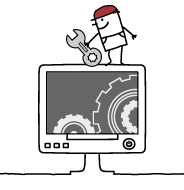In our world everything wants to be instant. Lunch? McDonald’s. Coffee? Starbucks. There is one on practically every corner. Then there’s the online world, where some consider e-mail to be immediate, and Twitter even faster. Heck, it’s on, all the time, so you must be too. Hurry, now, and give me my instant gratification!
There’s something wrong with this model. It doesn’t work. Most things aren’t instant, even those that are everywhere, everyday. We just have forgotten how to see and it makes it easy to lose patience or become overwhelmed.
There are whole industries built around promising something quick and instant, never telling those they market to that they haven’t a chance in hell of actually making it work, or getting the intended results.
The thing about it is – results require work. Things don’t happen by themselves. I see this a lot in my work at WP Angel. People come to me with a vision, and figure that things just spontaneously happen – WordPress is easy, right? Many of the things I do aren’t rocket science or brain surgery and yet the basic best practices are some of the most often overlooked things on a site.
WordPress is great and setting up a site can be pretty easy. Premium themes help a lot. Plugins are easy to find and install. Yet there are so many problems on sites where the best practices have been ignored. “Aw,” you say, “best practices are boring!” Maybe, and they are also one of those little things that come back to bite you.
Even if you have the best theme, the best plugins and pay minute attention to your posts and pages, getting everything just right, you can still run into trouble if you’re not doing the boring routine maintenance things.
So what are those routine things? I’m taking about routine maintenance, things like keeping WordPress up to date – yes it can stay up to date itself, but that doesn’t happen on all hosts, and what then? Someone has to make it happen. Then you’ve got Themes and Plugins to keep up to date too. Keeping things up to date means your site is more secure, which is a good thing.
Backups are another item in the boring but oh so necessary list. If you’re not running periodic backups yourself, you could run into trouble if something happens on your site. Your host will likely have a backup, but no guarantee on how quickly they can restore it and it may restore things back to a point you don’t want. Instead of waiting on them, if you have your own backup routine, you can respond and fix things that much faster.
You might be like Joe, and never update your site, it’s running WordPress 2.9.2 or something when the current version is 5+. Themes and plugins, you have a bajillion of them, and they aren’t up to date either. And for backups you’re relying on someone else, maybe your host?
Like Joe, it’s probably not your fault, you didn’t know you needed to do those updates, and it can be easy to ignore the nags in the Dashboard that remind you there are updates. That’s the dangerous route.
What’s the fix? Doing the updates. It’s not that hard and most go smoothly. How do you know there are updates to be made? That’s easy too. Your dashboard will tell you. It looks like this:
Click the update icon with the number next to it to go to your update page. This page will list out all of the updates: WordPress, plugins and themes, all in their own section.

Reminder, before you update it’s always a good idea to make a full backup of your site, just in case. You can read about how I do that here.

